Thanksgiving is one of America’s favorite holidays. Every year, millions of people across the nation take to the roads, rails and skies to make it home in time for this special day. And yet, for many, Thanksgiving Day often ends in tears—or a visit from the fire department.
Your Thanksgiving doesn’t have to be ruined by brawling relatives or kitchen emergencies. Here are some tips to help you avoid common Thanksgiving blunders.
Cooking Calamities
Imagine that it’s Thanksgiving and everyone is gathered around your table, hungry and waiting for the main course…which is still in the oven, partly frozen. The only situation more awkward and heartbreaking for hosts is the reverse of this scenario: You proudly remove the turkey from the oven, ready to serve it, only to find it’s been transformed into a charred lump.

Here are a few tips to help you prevent such setbacks and, if they do occur, to gracefully deal with them.
- Give yourself extra time to defrost anything frozen.
- Cook or bake everything you can well in advance of the Thanksgiving meal, especially breads and pies.
- Buy or make simple appetizers ahead of time in case the meal takes longer than anticipated to prepare. These don’t have to be complicated, just tasty.
- Measure the inside of your oven to ensure that your turkey will fit. If you need to feed a big group, remember that there’s no law stating that you have to cook the turkey whole. Buy a large assortment of turkey breasts, drumsticks and so on, or cook a smaller bird and make up for it with more side dishes.
Food Poisoning
Food poisoning is one of the worst imaginable outcomes of any group meal. No one wants to cook what they think is a beautiful feast, only to find out that it made their guests sick.
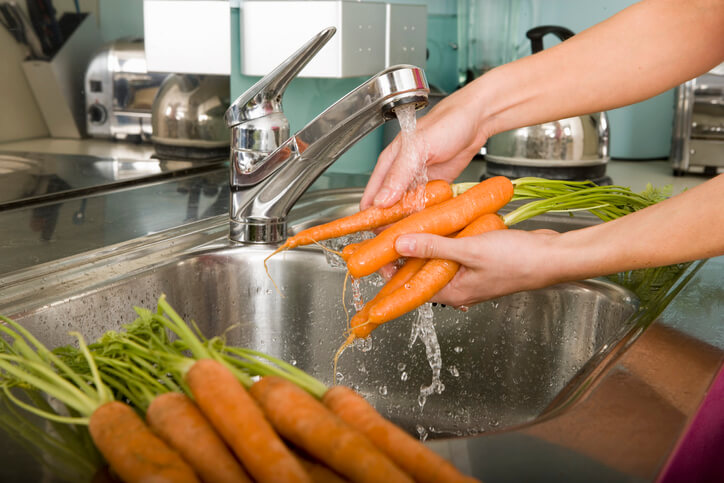
To protect yourself and your family from food-borne illnesses, follow these precautions:
- Wash hands and surfaces well, and follow the basic rules of food safety.
- If you’re not an expert in the kitchen, don’t feel you have to go all out with complex, fancy dishes or exotic ingredients. Everyone appreciates a simple, familiar meal, and no one will expect you to produce a turducken.
- Read and follow recipes carefully. If the cooking time or measurements look odd to you, check other similar recipes to make sure you’re not cooking unsafely because of a typo.
- Food allergies can be as bad as food poisoning, if not worse. Keep track of every ingredient you use so that you can provide correct, and maybe life-saving, information if guests ask.
Malfunctioning Appliances
Have you ever had your oven suddenly die on you with your pie half-baked, or your freezer stop freezing just in time to melt the ice cream you were going to serve with that pie?
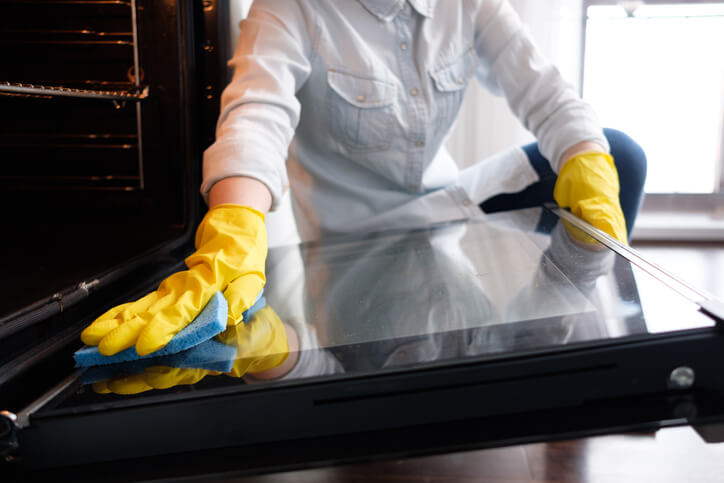
Though you can’t always ensure that your appliances will behave, you can take preventative steps to stave off last-minute menu catastrophes.
- If an appliance has been acting up, get a professional to inspect it. If need be, get it repaired or replaced before the holiday.
- When planning your menu, don’t neglect the delicious (and healthy!) dishes that don’t need to be cooked. Various salads, fruit plates and dips can satisfy your guests while you work on fixing that broken appliance.
- Keep alternate menu plans or cooking ideas in the back of your mind, just in case. You might be surprised at how well you can cook in a toaster oven.
If all else fails, keep calm and try to remember what Thanksgiving is actually all about: spending time with those you love and reflecting on the things in life that mean the most to you. Besides, there’s nothing wrong with eating pizza on the fourth Thursday in November.
Exploding Deep Fryers
You might have seen videos of Thanksgiving deep frying gone wrong. It may be amusing when it’s on YouTube, but it’s definitely not funny when it’s your own meal exploding, potentially damaging your property.
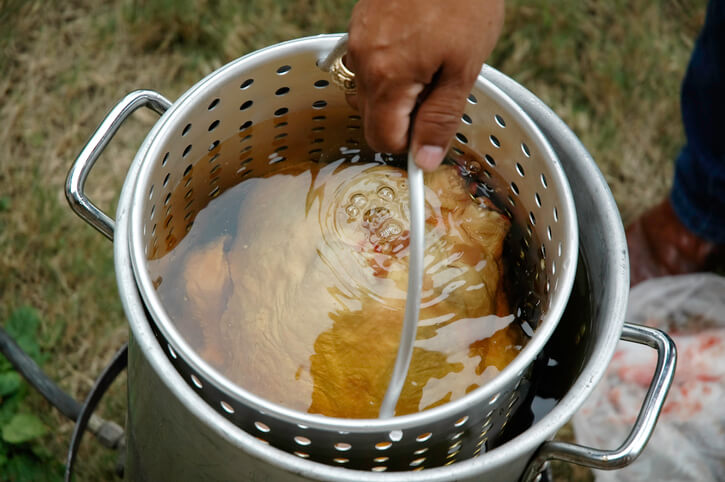
If you choose to cook your turkey in a deep fryer, here’s how to go about it:
- Before you place your turkey anywhere near your fryer, read up on the dangers specific to this cooking method (e.g., “deep fryers can easily tip over”), the precautions you should take and the tips for how to fry safely.
- Follow a proven recipe. The National Turkey Federation provides several, along with additional safety tips.
Fire Preparedness and Safety
A fire is one of the worst catastrophes that can occur when your family and friends are gathered together in your home, and it can happen easily—a stove-top grease fire or a blaze caused by a curtain or decoration coming in contact with fireplace or candle flames, for example.
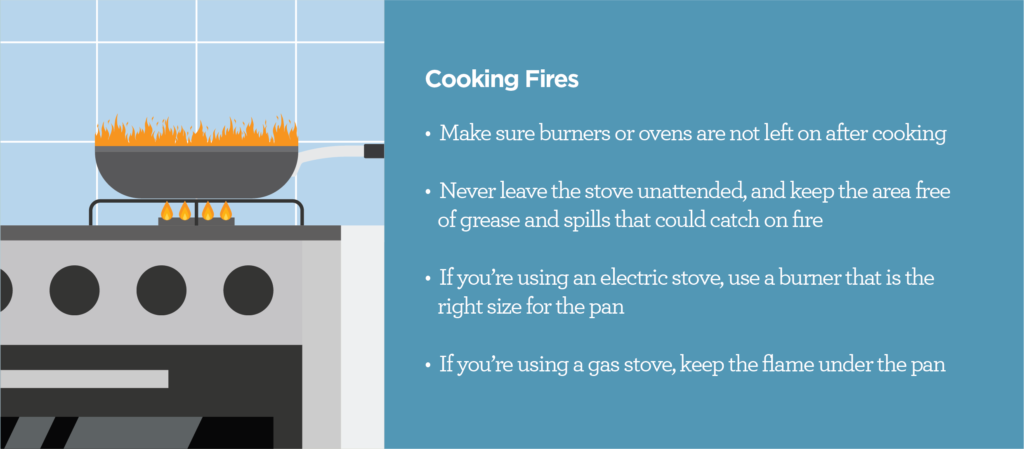
Fortunately, house fires can be prevented, as long as you follow safety rules and make sure any fire is immediately and appropriately-tended.
- Always pay attention to what’s happening in the kitchen. According to the American Red Cross, almost 90 percent of kitchen fires are caused by unattended cooking.
- Know how to douse a grease fire—don’t make the understandable but dangerous mistake of using water.
- Have working smoke detectors and fire extinguishers. They can mean the difference between a minor incident and a tragedy.
- Keep decorations far away from fireplaces, heaters and candles.
Shattered Dishes
Your Thanksgiving has gone smoothly so far, and you’re finally cleaning up and putting everything away, when a guest accidentally drops your great-grandmother’s one-of-a-kind serving dish.
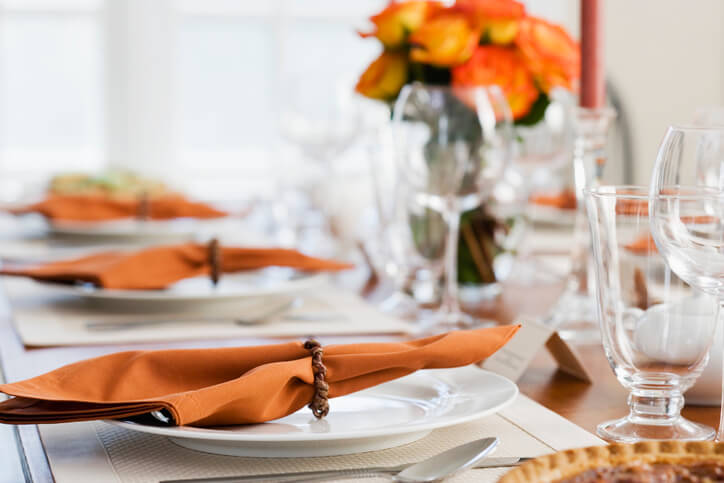
If this thought horrifies you, here’s how to avoid it and similar incidents:
- When in doubt, save pieces of great value—financial or sentimental—for display purposes and serve food on platters you wouldn’t be devastated to see in pieces on the floor.
- If your group is particularly boisterous (or just clumsy) consider using disposable cups and plates. These days, you can find attractive and seasonally appropriate paper plates, as well as plastic cups and even serving dishes at party supply stores.
- Assign specific cooking, serving- and washing-related tasks to responsible individuals. It’s nice when everyone wants to help, but giving certain chores to certain people will cut down on chaos in the kitchen.
Family Fights
This is one of the most dreaded Thanksgiving scenarios. Two siblings on opposite sides of a political issue or a parent who disagrees with their child’s choice of job or tattoo get into a fight that makes everyone in the room either angry, uncomfortable or miserable.
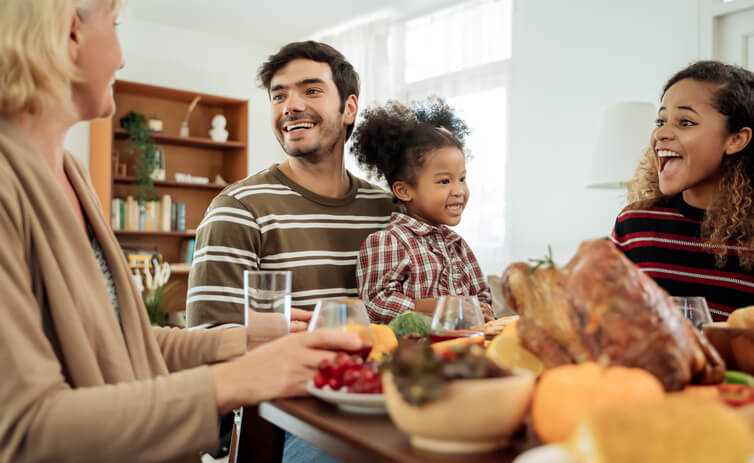
Thanksgiving Day fights are such a common occurrence that advice columnists weigh in on the dilemma every year. Here are some ways to prevent these family feuds:
- Limit the size of your gathering. Dear Amy advises hosts to ban the worst offenders. That might cause others close to them to stay away too, but it’s your home and you and your other guests should feel comfortable in it.
- Be assertive and set boundaries. Plan what you’ll say or do around pushy family members before they have the chance to push too far.
- Assign understanding family members to take on certain roles, like distracting squabbling children or leading your uncle into talking about his high school memories instead of his views on politics.
- Separate relatives who are likely to quarrel during dinner by carefully arranging your seating chart in advance. Pretty place cards on a beautifully-set table can hide the fact that it’s all a secret strategy to keep the peace.
- If someone tries to stir the pot, remember that the behavior is not about you and that you don’t have to take the bait.
Injuries
No one wants a guest getting hurt in their home, but accidents do happen. In the crowded and festive atmosphere of Thanksgiving, it’s easy for a cook to get burned or cut in the kitchen, or for a child—or even an adult—to trip and fall down the stairs.
Before you host a holiday meal, take the time to prepare your home to prevent injuries; and have emergency supplies on hand just in case.
- Child-proof your house if kids will be coming over.
- Check the condition of the lesser-used features of your home, like your tire swing or back deck, before inviting people—who may not realize they haven’t actually been sat or stepped on since the Carter Administration—to use them.
- Have basic first-aid supplies on hand, so that no one has to rush out in search of bandages on a night when many stores are closed.
Although it can be difficult, especially if you encounter problems on the day, it always helps to remember the obvious: Thanksgiving is supposed to be about giving thanks. As you get ready for the holiday, take the time to prepare for the worst but don’t forget to appreciate the best aspects of family, friends, food and fall.
What’s your favorite part of Thanksgiving? Are you on Team Turkey or Team Ham? Do you like your cranberry sauce from scratch or shaped like a can? What are you most thankful for this holiday season? Let us know in the comments.


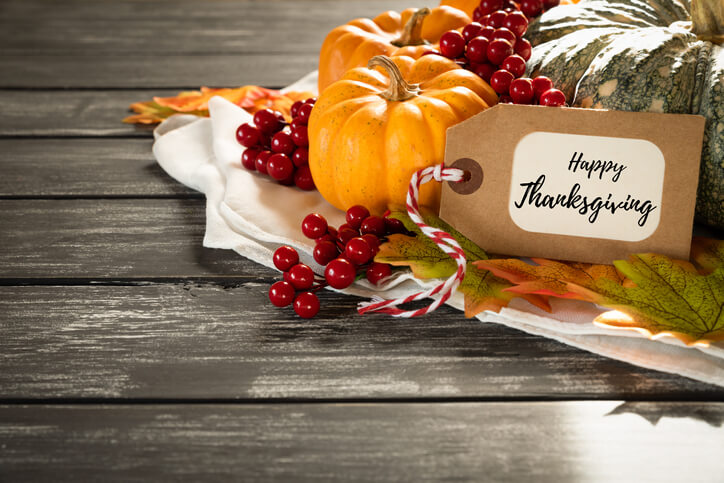
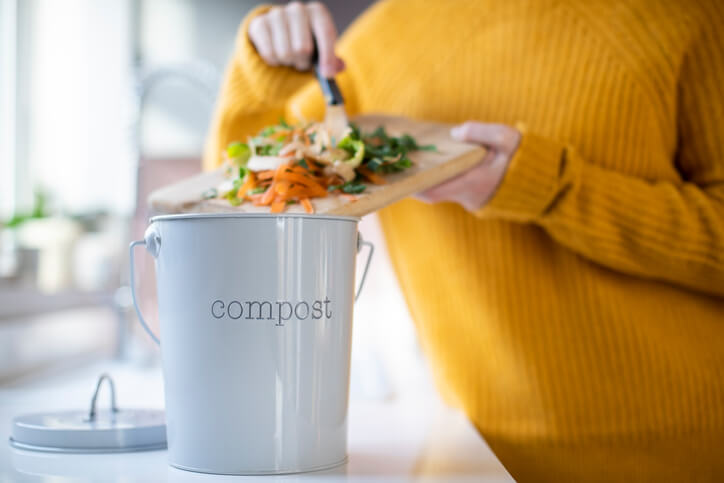

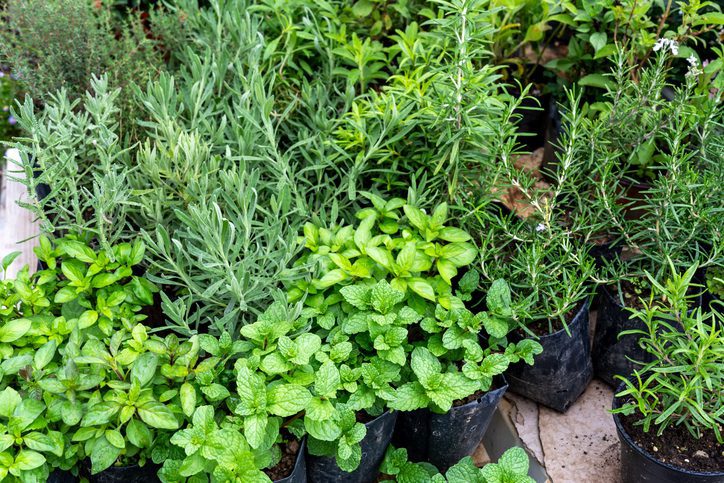

Pot Luck can also be a great help to such parties. Assign items to guests, especially if you know of a particular dish that someone does well. this should also increase comeradery amongst guests as they may wish to discuss their creations. Make sure everyone is assigned an item (even a jar of pickles) if you know they can’t cook
as a retired chef and restaurant manager this article is much of a review for me. I would like to say, it is well written and offers excellent advice especially for new comers to hosting a successful holiday gathering. I like the suggestions for hosting a squable free get together, this aspect can be very hard and stressful on a host who may have to make dicsions about who not to invite or for setting up a seating plan, etc.
nice work on this article
How unfortunate we need to be reminded how to behave respectfully when surrounded by family/friends. And, sadly, we also need to be reminded of this when driving a car, waiting in the checkout line, encountering a lane block ahead with signs directing use of 1 lane, and waiting in line to vote. Too many of us have lost the ability/desire to be mindful of others.
Very good advice Thanks